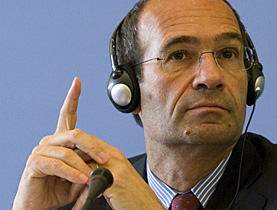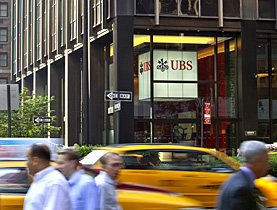French tax evasion threat has bankers guessing

Switzerland faces renewed pressure this week from suspicions that its banks have been harbouring the assets of French and Canadian tax evaders.
Some observers have been predicting an avalanche of probes and litigation aimed at the Swiss banking system following the success of a United States tax evasion investigation against UBS.
France confirmed at the weekend that it has obtained a list of 3,000 suspected tax cheats that have allegedly hidden up to €3 billion (SFr4.55 billion) in Swiss banks.
Canadian tax officials are also poised to meet executives from UBS in a bid to uncover Canadian wealth illegally hidden at the banking giant.
UBS was at the centre of a US tax evasion investigation that resulted in the bank handing over client information and paying a hefty fine to avoid going before the federal law courts. The Swiss government was forced to intervene to work out a deal in July to hand over the confidential data of 4,450 UBS clients.
However, it remains unclear whether the French and Canadian probes represent as big a threat to Swiss banking as the US investigation that forced major concessions from Switzerland.
Mystified
French budget minister Eric Woerth told the media at the weekend that the list of 3,000 suspect accounts had been partially declared voluntarily by two Swiss banks.
The Swiss Bankers Association said it was mystified by the statement that followed hard on the heels of a new double taxation treaty being agreed by the two countries.
“It is inconceivable that a Swiss bank located in Switzerland would unilaterally hand over a list of the names of its French clients to the French authorities without the authorisation of the relevant Swiss authorities and without a request for administrative or judicial assistance being made through the proper official channels,” spokesman James Nason told swissinfo.ch.
“In view of the pending ratification of the revised double taxation agreement the minister’s statements – assuming they have been correctly reported – strike us as being rather counterproductive.”
Suspected grandstanding
Woerth demanded that banks cooperate with the authorities and that tax cheats come clean, but he did not elaborate on how the list could be used to flush out evaders.
Stewart Hamilton, professor of finance and accounting at Lausanne’s IMD business school, wondered whether the French were indulging in some “grandstanding” only days before a scheduled meeting of ministers and bank officials.
“I’m not sure if the French are on a fishing expedition or have sufficient evidence that crimes have been committed,” he told swissinfo.ch.
Switzerland was forced earlier this year to commit to better cooperation with foreign tax jurisdictions with the renegotiation of double taxation treaties.
However, such agreements still require countries to provide proof of tax evasion before Switzerland is obliged to hand over details of accounts.
Canada has threatened to use the courts to force cooperation out of UBS, but one minister admitted that the number of tax cheats was unknown.
Strong system
The United States was successful in its prosecution of UBS largely because it had obtained solid evidence from whistleblower Bradley Birkenfeld that bank employees had actively helped tax evaders.
Canada appears to lack such a weapon to use against Swiss banks.
Stewart Hamilton believes Switzerland is strong enough to repel such attacks thanks to the excellent standing of its banking system, despite the battering its image has taken recently.
“Switzerland has a strong track record in asset management that makes it an attractive place for wealthy people to invest their money. I suspect that the proportion of people using banks for tax evasion is not that high,” he told swissinfo.ch. “The world needs Swiss banks.”
Matthew Allen, swissinfo.ch in Zurich
Switzerland has long been suspected of harbouring tax evaders from other countries thanks to its banking secrecy laws and its legal distinction between tax fraud and evasion – the latter is not a crime.
Pressure on Swiss banks to reform escalated as the financial and economic crisis set in, depriving governments of income.
Earlier this year, combined pressure from several major economies and the Organisation for Economic Co-operation and Development (OECD) forced Switzerland to enhance its cooperation with foreign tax jurisdictions to get itself delisted from a tax haven “grey list”.
This involved renegotiating double taxation treaties with a host of countries to emphasise the exchange of information when evidence of tax evasion was produced.
In 2008, the US tax authorities uncovered evidence that UBS bank had been helping its citizens evade taxes. This was based on testimony by a former employer, Bradley Birkenfeld.
In February of this year, the bank agreed to pass on some confidential client data, only to face a court order to hand over a further 52,000 names.
Intense diplomatic talks between Swiss and US officials brokered a deal that would allow the potential release of 4,450 UBS client details. The official request for this information arrived on Monday and will take about a year to process completely.

In compliance with the JTI standards
More: SWI swissinfo.ch certified by the Journalism Trust Initiative











You can find an overview of ongoing debates with our journalists here . Please join us!
If you want to start a conversation about a topic raised in this article or want to report factual errors, email us at english@swissinfo.ch.